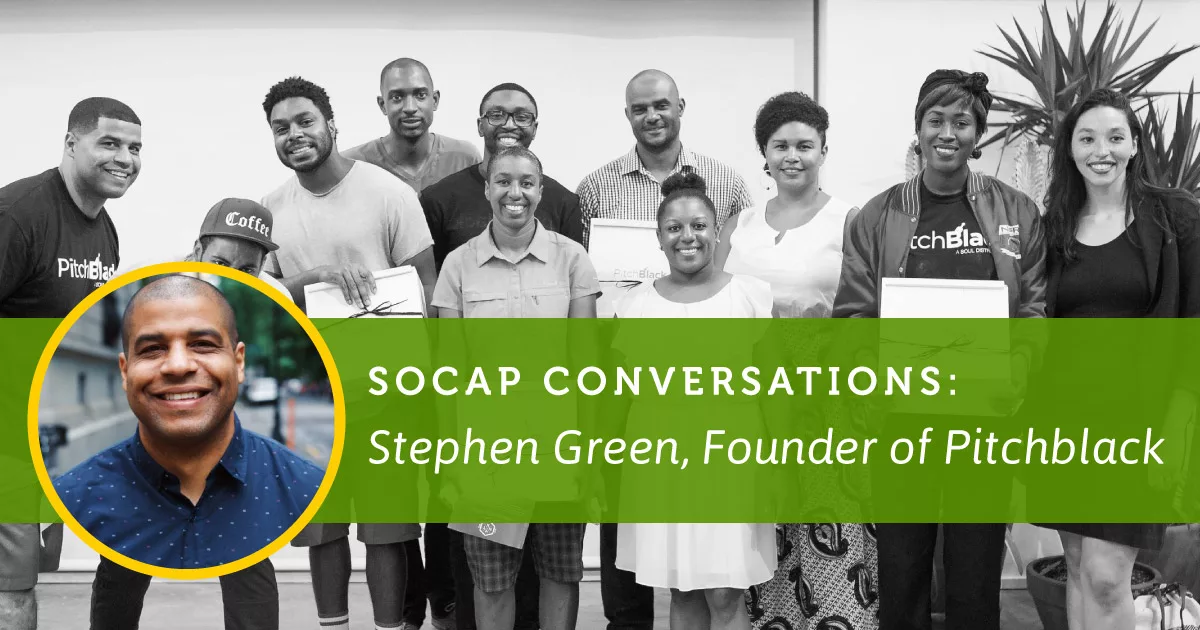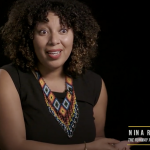At the start of his talk at TEDx Portland, Stephen Green shared a few “unexpected” facts about himself. “I’m Blatino (Black + Latino), an economist, and a recovering banker.” He could have also mentioned that he is a lifelong Portland resident, a serial entrepreneur, a startup mentor and advisor to portfolio firms for Backstage Capital. Throughout all of these different phases of his life and career, Stephen Green has always been a champion for business owners and underrepresented entrepreneurs.
Green is also the founder of PitchBlack–a national pitch competition series that gives Black and Latinx startup entrepreneurs a platform to promote their business ideas, compete for funding, and make critically important connections within the startup ecosystem.
He recently transitioned from a role leading WeWork Labs Portland to his dream job as the Director of Operations for Pensole Footwear Design Academy. Pensole is an African-American owned startup that Green describes as “the world’s first footwear design school.” Pensole helps creatives get the training and knowledge they need to design shoes and apparel for Nike, Jordan, and other major brands in the footwear industry.
We recently sat down with Green to get his perspective on the challenges facing entrepreneurs of color in the Pacific Northwest and nationally and what it will take to create a truly inclusive and equitable economy for all founders.
SOCAP: What led you to create PitchBlack? What impact has your pitch competition generated?
In 2015 some new census data came out saying that as of 2012 there were over 5000 black owned businesses in the state of Oregon. Which really didn’t match up with who I was seeing among entrepreneurs here. I had access to an event space at the time and figured since I’ve got a space and I know a few folks, I’ll host an event to bring people together in the same room who may not be aware that the others exist. I thought hey-we’ll have our own Shark Tank except we’ll have people pitch the audience.
I was hoping that first year that we would have 30 or 40 people show up. We ended up having over 120 people. It was amazing.
The coolest thing about that first event was the pitches, but more important was learning what social capital people were willing to bring into the room. You had all these people who lived in the same city who had never been in the same room together. We had people from the dominant culture and entrepreneurial ecosystem meeting Black entrepreneurs that they had never encountered before. There were really cool interactions happening even before the pitching started. “Oh wow, did you just start?” “No I’ve been in business for years and I grew up here.”
After that first PitchBlack in Portland I got calls from people who were interested in replicating it in Austin, TX and a few other cities. We ended up partnering with them. They’ve done it three times down there in Austin. We’ve done it twice in Seattle and four times in Portland. The 38 people who pitched at that first event in Portland have gone on to raise over $35M for their companies in that time frame.
It has been pretty amazing. The most important thing is that people in the entrepreneurial ecosystem here now recognize that these entrepreneurs exist and are aware of all the different things they do. When selecting who gets to pitch, I try to highlight people upstream and downstream. Some of them are at the idea stage whereas other people have been in business for years and they are doing very, very well. It’s just an opportunity for all people, Black, White, and otherwise, in our community to see the depth and reach of Black entrepreneurs in the city.
SOCAP: You’ve been working recently to raise awareness that, despite increased bank deposits and profits, statistics show that capital has “dried up” for Black owned businesses in Oregon. What are some of the causes, impacts, and potential solutions to this?
One of the things I’ve learned working in access to capital for the last 20 years is that money is really important, but if you don’t have the social capital then the money just prolongs the inevitable. When these pools of money start to disappear what it really does for these entrepreneurs is that it doesn’t allow them to build the social capital they need to expand their businesses and scale.
What I’m hoping will happen with the little data that we have is to rally people to say – hey, this is a problem. What is our role in helping to close the gap? Not talking about it, and not doing anything to change this, will not help entrepreneurs.
Since 2000, 40% of the banks in the state of Oregon have disappeared because of consolidation. That is happening all over the country. One result of that is that the number of SBA loans to black owned businesses have gone down 96% between 2008 and 2017. I don’t think it is on the banks to fix that, as much as I think it is on banks to say–hey, this is changing dramatically. Who else is picking up the slack? If it is a 96% drop here, what are the other funding opportunities out there for these business owners?
Like most businesses around the country, the number one way businesses are funded is through friends and family money. Within the Black community, intergenerational wealth is typically not there to properly fund someone’s business. What I am hoping to draw attention to are the new things that are happening–things that we can plug these entrepreneurial ecosystems into to make sure that they can stem that gap. And it can’t just be equity.
I think venture capital has become really popular, but at the end of the day it’s a really myopic tool. Many businesses will never be a good fit for venture capital, but that doesn’t mean they don’t have a great business. So what are the other alternatives? That gets into lending and crowdfunding. These conversations just haven’t been happening at that level when you talk about founders of color and women, founders of color in particular.
SOCAP: If you could wave a wand and make one change right now to ensure that all entrepreneurs have equal access to the capital and resources they need to succeed, what would that change be?
I think waving a magic wand right now means having the folks who have the platforms call out the issue. That hasn’t happened yet. The original article I cited that covers the drop in capital going to Black owned businesses here in Portland was done by the Portland Business Journal almost a year and a half ago. Really, no organizations said or did anything about this crisis besides Business For A Better Portland. All these organizations say that they want to help businesses and they are all about small business-but when a huge opportunity gets called out like this everyone is silent.
So it’s great that people are coming to the table and are ready to talk now, but this has been happening. It is not a new thing. And so waving a magic wand would be the folks in power–the SBA, the Oregon Bankers Association saying–this is a huge issue. We don’t know what the answer is but we are going to first start by calling it out. That hasn’t happened yet.
SOCAP: Are there any organizations locally and nationally, that you would point to that are doing some outstanding work to create a more inclusive and equitable economy?
Nationally I would point to ICA Fund Good Jobs. They take a firm stance on helping grow companies that add living wage jobs in the communities they serve–mainly Oakland and San Francisco. I love that their model is based on helping business scale and grow.
Locally, we have a lot of microenterprise providers that help get businesses started. And we need that work. It is just that after someone gets a business started the resources to help them grow dries up. If you have a successful food cart–that is awesome, but if you know you could scale up to 15 food carts-we just don’t have the resources or connections within our ecosystem that can help you do that. What we need here in Portland are organizations that help businesses scale, that also have the cultural competence to work with women and people of color along the way–that understand the cultural cues and context with which to do that work. I am hopeful that the call to action by Business For A Better Portland will lead to other organizations and agencies stepping into the fray to be accomplices in this work locally and nationally.
SOCAP: From your experience as a mentor and startup advisor, what is some of the most common advice you offer to entrepreneurs?
Working with founders for the last 20 years, and being one myself, I think there are two things that I always hear. The first is: I wish I had started earlier. My advice is, start now. People often find themselves waiting for the perfect moment or the right credentials or whatever it is and they don’t move forward. Don’t aim for perfect, you’ll never get there. Done beats perfect all the time.
Secondly, have balance. Don’t fall for the myth that as an entrepreneur you have to work 18 hour days and can’t have a family or friends. All of those things are the reasons why you want to build wealth. It is always tough seeing a very successful entrepreneur and hearing them talk about their regrets. I wish I had gone to my daughter’s prom or I wish I had made that trip with my family. I think balance is really pressure to live your life.
SOCAP: What is inspiring you in your work right now?
Mainly seeing all these young folks, especially young women, getting into being entrepreneurs. A number of People of Color are not worrying about whether they went to the right school or know the right people or were in the right fraternity. They see a problem that they have a specific knack for solving and are going all in to try and solve it.
You look at someone like Arlan Hamilton who started Backstage Capital. How can you not be inspired by somebody who not too long ago was literally living in the San Francisco Airport. I met her before she was the big deal she is today. Knowing and seeing her over the last four years has really inspired me. I tell people all the time, “You can literally be anything you want to be.” To see her perseverance is what inspires me. I am also a father of three. I can make sure that my kids are in proximity to folks like that-so they can see folks that look like them do amazing things out in the world.
SOCAP: What is your call to action for the SOCAP community?
I can’t speak for other markets, but particularly here in Portland we’ve gotten to the point where people know that it is important to say things like “equity and diversity and inclusion.” The problem is that it hasn’t become urgent. We “try” at the things that are important but we need to “do” the things that are urgent. Urgency looks like each of us leveraging our time, talent and treasure to change the experiences and outcomes of underestimated founders.
Come hear Stephen Green in conversation in Seattle at SOCAP 365 PNW: Accelerating the Impact Ecosystem. This March 25, 2019 event at Impact Hub Seattle will be focused on growing the marketplace for social entrepreneurs and impact investors in the Pacific Northwest.
Watch Stephen Green’s TEDx Portland talk from 2017
Additional Resources
- Meet the Minority Entrepreneurs Forging A More Inclusive Startup Scene in Portland
- PitchBlack’s Stephen Green on the chasm for black entrepreneurs in Portland, Portland Business Journal (requires a subscription)
- Inside the decline of small business lending in Oregon and why minority- and women-owned businesses are hardest hit, by Matthew Kish for Portland Business Journal (requires a subscription)
- Portland’s black residents putting faith in ‘Soul District’ to counter gentrification
- Portland Fund Fuels Minority and Women Entrepreneurs
- America’s Whitest City Explodes With A Fusion Of Inclusion TechCrunch




